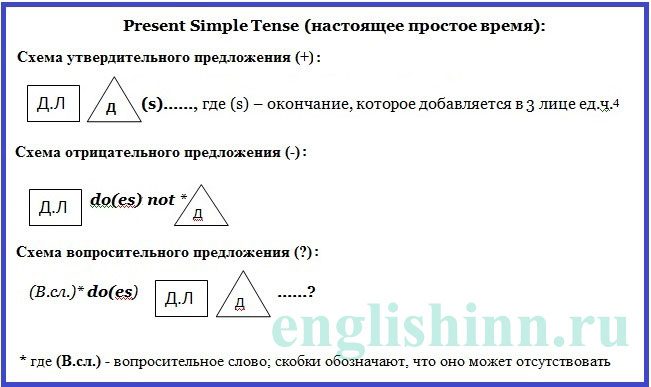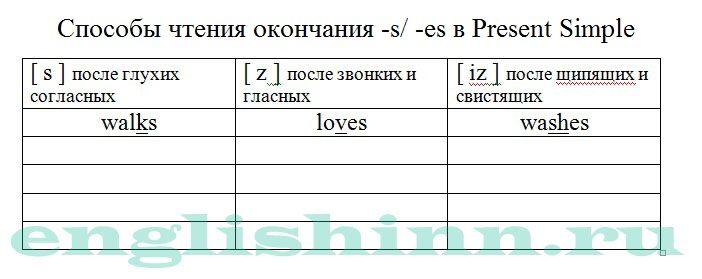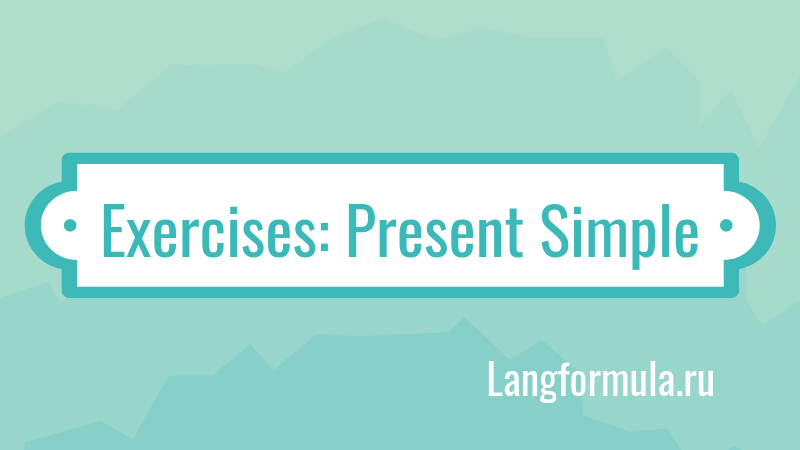Present Simple. Упражнения на отработку с ответами. The Present Simple Tense Exercises with answers
Займемся отработкой английского времени Present Simple (Present Indefinite). Но прежде, предлагаю вам обратить внимание на эту статью, где доступно описаны случаи употребления Present Simple. Практически все упражнения даются с ответами.
Present Simple / Indefinite Exercises.
Упражнение 1. Напишите форму 3-го лица ед. числа следующих глаголов
Упражнение 2. Put the verbs in the Present Simple form.
Упражнение 3. Вставьте глаголы из скобок в форме Present Simple. Yan is at a summer camp in Poland. Write what he usually does in the camp. Put the verbs in bracket in the correct form.
He ________ (get) up at 7. He ________ (have) his English lesson every day. Не ________ (speak) English to his friends. He ________ (play) board games in the afternoon. Sometimes he ________ (swim) in the lake. He often ________ (go) hiking. He sometimes ________ (sit) by the camp fire in the evenings. He never ________ (go) on a trip without his friends.
Упражнение 4. Вставьте глаголы в Present Simple. Put the verbs in the present form.
go, like, love, watch, read, like, walk, come, do, watch
My name’s Pavel. In the evening I usually (1) ___________ my homework. Then I (2) ___________ TV or video. I (3) ___________ action films! They are super! Then I (4) ___________ my dog. After that I (5) ___________ home, (6) ___________ a book and (7) ___________ to bed. My sister is little. She doesn’t (8) ___________ action films. She (9) ___________ cartoons. She (10) ___________ them every day.
Упражнение 5. Рассмотрите таблицу. Напишите про Элли. Look at the chart and write about Ellie.
The Present Simple Tense. Упражнения (уровень базовый)
The Present Simple Tense переводится настоящее простое время, но является совсем непростым) Я подобрала для вас упражнения на Present Simple, которые относятся к уровню изучения английского языка «базовый — beginner». Эти упражнения помогут вам отработать грамматические правила на Present Simple Tense.
The Present Simple Tense. Упражнения из цикла «Английский язык для начинающих»
Work, go, know, change, buy, end, play, wash, ride, add, wish, drive, stay, watch, mix, open, do, say, clean, talk, visit, reach, sit, like, love, dance, close, speak, read, finish, fly, run.
Упражнение 2. Напишите следующие глаголы в форме 3-го лица единственного числа.
want hurry read eat think wash kiss catch have study carry fly cry go do
Прежде, чем идти дальше — запомните схемы построения предложений в Present Simple

Учимся строить утвердительные предложения в Present Simple
Упражнение 3. Замените местоимение I на местоимения he или she по образцу.
1. I write many letters every day. 2. I read books from the library. 3. I study grammar rules by heart 4. I usually go to work by bus. 5. I often meet my friends on the way to work. 6. I work in an office. 7. I come home very late. 8. I have dinner (supper) at 9 o’clock. 9. I go to bed at 12 o’clock. 10. I sleep very badly. 11. I often send emails in the evening. 12. I play the guitar every day.
1. Не go … to school by bus. 2. She like … milk. 3. My father watch … TV in the evening. 4. I play … tennis on Sundays. 5. My brother play … football well. 6. My sister sing … very well. 7. She wash … her face and hands in the morning and in the evening. 8. I usually drink … tea for breakfast. 9. Jane do … her English exercises after school. 10. Peter drive… a car.
Упражнение 5. Выберите из скобок нужную форму глагола.
1. She (swim/swims) very well. 2. Luc (live/lives) in London. 3. Jack (come/comes) from the USA. 4. Betty (dance/dances) a little. 5. He (have/has) three brothers. 6. My granny (speak/speaks) French. 7. My cat (sleep/sleeps) on a mat. 8. I often (see/sees) Jane. 9. Ted (like/likes) music. 10. Chris (cook/cooks) cakes quite well.
Учимся строить отрицательные предложения в Present Simple
ПРИМЕРЫ
Он часто ходит в кино. — He often goes to the cinema.
Он не ходит в кино. — Не doesn’t go to the cinema.
Упражнение 6. Переделайте данные предложения в отрицательные. Используйте вспомогательные глаголы don’t и doesn’t.
1. Mary takes the dog for a walk in the evenings. 2. Peter buys a morning newspaper every day. 3. I come to every lesson. 4. We go to the seaside every summer. 5. You go shopping on Saturday mornings. 6. Peter plays the piano very well. 7. The sun rises in the west. 8. My big brother knows everything. 9. Dogs like cats. 10. Some children like chocolate. 11. It rains very often in summer.
Dogs — собаки (множественное число: a dog — dogs); children — дети (множественное число, сущ.-исключение: a child — children)
Упражнение 7. Заполните пропуски, используя don’t или doesn’t.
1. We … listen to the radio every night. 2. Mr Johnson … have a private office. 3. The boys … study at the library every day. 4. These exercises … seem very difficult. 5. The men … always eat at that cafe. 6. That tall man … work for this company. 7. The people … speak English very well.
Men — мужчины (множественное число, сущ.- исключение: a man — men); people — люди (множественное число, сущ.- исключение: a person — people)
Упражнение 8. Сделайте данные предложения отрицательными.
1. Bess helps her mother. 2. My friend plays the piano. 3. We listen to music. 4. You make a lot of mistakes. 5. The farmer works in the field. 6. The small boy rides a bike. 7. He looks at the pictures in the book. 8. The workman paints the house. 9. Richard and Henry swim in the river in summer. 10. John goes to school by tram. 11. She gets up at eight o’clock. 12. He has tea for breakfast. 13. She usually has dinner at two o’clock. 14. Peter lives in London.
Учимся строить вопросительные предложения в Present Simple
СРАВНИТЕ
Он часто ходит в кино. — He often goes to the cinema.
Он часто ходит в кино? — Does he often go to the cinema?
Упражнение 9. Заполните пропуски, используя вспомогательные глаголы do или does.
1. … you want cream and sugar in your coffee? 2. … the children go to bed very early? 3. … that girl come from South America? 4. … you know that Italian student? 5. … Miss Stewart prefer coffee or tea? 6. … your English lessons seem very difficult? 7. … those two women understand that lesson?
Упражнение 10. Переделайте данные предложения в вопросительные. Задайте общие вопросы, используя вспомогательные глаголы do и does.
1. Mary takes the dog for a walk in the evenings. 2. Peter buys a morning newspaper every day. 3. I come to every lesson. 4. We go to the seaside every summer. 5. You go shopping on Saturday mornings. 6. Peter plays the piano very well. 7. The sun rises in the east. 8. My big brother knows everything. 9. Dogs don’t like cats. 10. All children like chocolate. 11. It rains very often in autumn.
Упражнение 10.1. Вспомните, как строить краткий ответ в Present Simple. Ответьте на вопросы.
1.Do you watch TV in the evening? 2. Do you go to bed late? 3. Do you sleep well? 4. Do you have breakfast at home? 5. Does your friend often visit you? 6. Does your friend read books? 7. Does it often rain in winter? 8. Does it often rain in autumn? 9. Does the sun rise in the west? 10. Does the sun rise in the east?
ПРИМЕР Куда он часто ходит? — Where does he often go?
Упражнение 11. Переделайте данные предложения в вопросительные. Начинайте вопросы со Wh-words в скобках.
1. Ann watches TV. (How often?)…
2.I write emails to my parents. (How often?)…
3. They have dinner in the evening. (What time/usually?) …
4. Tom works. (Where?) …
5. Mark and his sister go to the cinema. (How often?)…
6. People do stupid things. (Why?) …
7. The car breaks down. (How often?) …
Упражнение 12. Составьте из данных слов вопросительные предложения. Используйте схему вопроса (?)
1. buy/you/do/what/at the shops
2. is/who/that man
3. your parents/moment/where/at the/are
4. you/how/come/to school/do
5. is/your car/where
1. The Greens live in Tomsk. (Where)
2. She lives in Green Street. (Where)
3. Grace usually has supper at nine o’clock. (When)
4. Tim reads many books. (Does)
5. Sally speaks Spanish. (Does)
6. We have English lessons on Tuesdays and Fridays. (Do … or…)
7. They work on a farm. (Where)
8. I make my bed in the morning. (Do)
9. The children play in the park, not in the square. (Do … or…)
10. They do their homework after school. (When)
11. I have a glass of milk for supper. (What)
12. We like watching TV in the evening. (Do)
Упражнения на повторение
Упражнение 15. Вставьте вместо точек does, is или has.
1. My sister … very clever.
2. What … she do?
3. Who … he?
4. She … a teacher at school.
5. Where … your sister live?
6. Gretna … a little village in the country.
7. … Mary fine?
8. … Sam have any pets?
9. This girl… called Mary.
10. She … a lot of friends.
Упражнение 16. Поставьте глаголы, данные в скобках, в нужной форме.
1. Не (be) a good footballer. 2. We (be) at school. 3. The roses (be) very beautiful. 4. I (have) an interesting book. 5. The sun (be) very hot. 6. I (do) my lessons carefully (тщательно). 7. Elizabeth (have) a new dress. 8. The students (do) English lessons three times a week. 9. I (have) a camera. 10. Harry (be) a tennis player. 11. Tony (have) a coat. 12. The children’s hands (be) dirty. 13. Mike (be) late for school. 14. Ted (be) a good swimmer.
Упражнение 17. Составьте из следующих слов вопросы. Помните о порядке слов в предложении.
1. Does/what/up/get/she/time?
2. Do/breakfast/does/what/she/before?
3. For/does/have/breakfast/she/what?
4. To/how/she/work/does/go?
5. She/does/what/evening/do/the/in?
6. Bed/time/does/to/what/she/go?
Упражнение 19. Составьте из данных слов вопросы. Дайте на них ответ. Сделайте нужные изменения.
1. Where/you/come/from — _____________________
2. Where/you/live — __________________________
3. Where/you/work — __________________________
4. What/your father/do — _______________________
5. Where/your mother/live — _____________________
Упражнение 20. Вставьте наречия, указанные в скобках, в данные предложeния. Помните о месте наречий в предложении.
1. She comes home late. (Always)
2. George eats meat. (Never)
3. You see her in the street. (Sometimes)
4. Does Tim go to school by taxi? (Usually)
5. We spend summer in France. (Usually)
6. Tom and Tim go to the cinema on Mondays. (Often)
7. My dog barks. (Sometimes)
8. Kate goes swimming. (Often)
9. Simon does his English homework. (Never)
10. I dance at discos. (Seldom)
Упражнение 21. Переведите на английский.
Упражнение 22. Исправьте ошибки в предложениях.
Упражнение 23. Раскройте скобки, употребляя глаголы в Present Simple.
(USUALLY) 1. My working day (to begin) at seven o’clock. I (to get) up, (to switch) on the radio and (to do) my morning exercises. It (to take) me fifteen minutes. At half past seven we (to have) breakfast. My father and I (to leave) home at eight o’clock. He (to take) a bus to his factory. My mother (to be) a doctor, she (to leave) home at nine o’clock. In the evening we (to gather) in the living room. We (to watch) TV and (to talk). 2. My sister (to get) up at eight o’clock. 3. She (to be) a schoolgirl. She (to go) to school in the afternoon. 4. Jane (to be) fond of sports. She (to do) her morning exercises every day. 5. For breakfast she (to have) two eggs, a sandwich and a cup of tea. 6. After breakfast she (to go) to school. 7. It (to take) him two hours to do his homework. 8. She (to speak) French well.
Я надеюсь, что выполнив упражнения на Present Simple, вы научились составлять предложения грамматически правильно. Если этих упражнений недостаточно, то рекомендуем упражнения на Present Simple intermediate из учебника Murphy №1 (из сборника Murphy. English Grammar in Use).
The Present Simple Tense (Настоящее простое время). Упражнения с ответами
Настоящее простое время употребляется:
Подружились с настоящим простым временем? Сейчас проверим!
Exercise 1. Вставьте глагол to be в Present Simple.
Answers: 1. is, is. 2. is, is. 3. is, is. 4. are, am. 5. am. 6. is, is. 7. is, is. 8. are, are, are. 9. is, is. 10. are, am. 11. is, is, is. 12. is, is. 13. is, is. 14. is. 15. is, is. 16. is. 17. is. 18. is. 19. is. 20. is, are, is, is, is, is, is, is.
Exercise 2. Запишите глаголы в правильную колонку в третьем лице единственного числа в соответствии с правилами написания слов.
Cook, study, clean, buy, teach, go, fry, like, discuss, watch, drink, help, copy, run, tidy, open, pay, catch, swim, ride, do, mix, listen, fly, wish, meet, marry, come.
Exercise 3. Перепишите предложения в третьем лице единственного числа, используя слова в скобках.
Answers: 1. Mike always helps his grandparents. 2. Andy likes to swim in the swimming-pool. 3. Vicky makes the best pizza in our town. 4. Larry meets our friends every weekend. 5. Dolly knows everything about cats. 6. Nelly writes wonderful poems. 7. Garry understands French well. 8. Sam teaches my little brother to ride a bike. 9. Pam often plays with the ball in the yard. 10. A bird sings merrily in the tree. 11. My cousin often flies to Prague. 12. His mother always watches TV in the evening. 13. Alice sometimes sees him in the library. 14. My father usually washes the car on Saturday. 15. Bill never tells lies.
Exercise 4. Дополните предложения подходящим словам из скобок.
Answers: 1. She; 2. We; 3. I; 4. He; 5. My sister; 6. My watch; 7. Rita; 8. You; 9. Her cousins; 10. My Granny.
Exercise 5. Поставьте глаголы в скобках в правильную форму.
Answers: 1. drinks; 2. like; 3. walk; 4. spend; 5. works; 6. start; 7. walks; 8. play; 9. buys; 10. begins; 11. visit; 12. has; 13. rains; 14. costs; 15. take.
Exercise 6. Дополните предложения don’t или doesn’t.
Answers: 1. don’t; 2. doesn’t; 3. don’t; 4. don’t; 5. doesn’t; 6. don’t; 7. doesn’t; 8. don’t; 9. don’t; 10. doesn’t; 11.doesn’t; 12. don’t; 13. doesn’t;
14.don’t; 15. don’t.
Exercise 7. Сделайте предложения отрицательными.
Answers: 1. Martin doesn’t often go fishing in summer. 2. You don’t always buy fresh newspapers. 3. His mother doesn’t bake tasty pies. 4.This fruit salad doesn’t taste delicious. 5.Pineapples don’t grow in trees. 6.My dog doesn’t eat tomatoes and pears. 7.People don’t know a lot about the life on other planets. 8. I don’t always travel with my grandparents. 9.They don’t plant flowers and trees every spring. 10. Girls don’t always like to do the washing-up.
Exercise 8. Дополните предложения don’t или doesn’t и дайте утвердительный и отрицательный ответы на вопросы.
Answers: 1. Do you like to travel? — Yes, I do./No, I don’t. 2. Does your friend go in for sport? — Yes, he (she) does./No, he (she) doesn’t. 3. Do your parents like to play computer games? — Yes, they do./No, they don’t. 4. Does your father drive a car? — Yes, he does./No, he doesn’t.
5. Does your mother watch the news on TV in the evening? — Yes, she does./No, she doesn’t. 6. Do your classmates always come to school in time? — Yes, they do./No, they don’t. 7. Do your grandparents live in the country? — Yes, they do./No, they don’t. 8. Does your mother often meet her friends? — Yes, she does./No, she doesn’t. 9. Dо you have a dream? — Yes, I do./No, I don’t. 10. Do you often visit your grandparents? — Yes, I do./No, I don’t.
Exercise 9. Сделайте предложения вопросительными.
Answers: 1. Do Liz and her sister often go skating to the skating-rink? 2.Does our teacher always prepare us for tests? 3.Does her dog like to sleep on the sofa? 4.Do we usually make photos for the school newspaper? 5.Does Den often go on a ride with his friends? 6.Do Ted and Victor prefer to travel by car? 7. Does it often rain in spring? 8.Does his sister run a small cafe? 9.Do the Harrods usually visit their relatives in the country? 10. Do all children like sweets and ice cream?
Exercise 10. Составьте предложения, расставив слова в верном порядке.
Answers: 1) Does your sister help you with washing-up? 2) He hates to get up early on Sunday. 3) We don’t spend much time at the seaside. 4) The weather often changes in spring. 5) Do you often visit your relatives? 6) He doesn’t know my phone number. 7) Do her grandparents grow any vegetables in summer? 
10) My mother doesn’t drink tea without sugar.
Exercise 11. Поставьте глаголы в скобках в правильную форму.
Answers:1. Where does your brother usually go after classes? — He usually goes to the swimming-pool. He has trainings four times a week. 2. Why does your sister always get up so early in the morning? — Because she helps my mother to cook breakfast for the whole family.— Don’t you cook breakfast for yourself? — No, I don’t. I usually walk the dog before going to school. 3. What do you usually do on Saturdays? — Well, in the morning I go shopping with my mother and then I take my younger sister to the Art Studio. She paints very well and dreams of becoming a designer.— Do you meet your friends on Saturdays? — Of course, I do. We often go to the cinema or to the disco on Saturday evenings. 4. Why does Fred need to buy flowers? — It is his sister’s birthday today. She loves flowers and Fred believes it is the best present for her. 5. What time does this programme start? — It always starts at eight in the evening.— Do you always watch it? — No, I don’t always watch it because sometimes I have to meet my younger brother at the tram stop. He often returns from the football training at this time.
WELL DONE!
Литература:
Образование отрицания в present simple (задания для самостоятельной работы)
В этом файле вы найдёте задания для самостоятельной работы по теме «Образование отрицания в present simple»
Просмотр содержимого документа
«Образование отрицания в present simple (задания для самостоятельной работы)»
Задание №1 Образуйте из утверждений отрицания!
Задание №2 Вставьте подходящий по смыслу глагол в нужной форме!
1) He____not play chess every Tuesday. (does, do, is,);
2) He ____not a driver. (can, is, have);
3) They_____not write test every Friday. (do, is, does);
4) My sister ____not ten. (is, can. has);
5) They ____got a rabbit. (has, are, have);
6) My parents _____not 40. (are. is, can);
7) Andrew and Mike ___not like apples. (do, does,is)
задание№3 Образуйте утверждения из отрицаний!
1) Mike is not a student._______________________________;
2) Jess cannot dance________________________;
3) My cat is not white______________________;
4) They are not sisters_____________________;
5) Mary does not read newspapers in the evening____________________________;
6) You have not got a parrot _________________________;
7) She has not got a brother_________________________.
Задание 4- Образуйте из утверждения отрицание!
5) Julia has got a cat-_________________;
6) Mary draws pictures on holidays-________________________;
7) Jack and Nick have got a bike-_______________________;

Задание 5- Образуйте из отрицания утверждения!
1) We are not ten_________________;
2) She cannot dance____ _____________;
3) Mike and John are not brothers__________________________;
4) My grandma does not like lemons_______________________;
5) She is not a teacher_______________________;
6) My friends do not like oranges _____________________;
7) I have not got a sister______________________________;

Упражнения на Present Simple с ответами и переводом
Пройдите упражнения на Present Simple, чтобы лучше понять и запомнить, как употребляется это время в английском языке. Если вы еще не знакомы с темой, либо знакомы, но хорошо ее подзабыли, рекомендую сначала прочитать эту статью: “Present Simple – настоящее простое время в английском языке”.
Упражнение 1: Present Simple в утвердительных и отрицательных предложениях
Утвердительная и отрицательная формы строится очень просто, единственный нюанс – форма 3-го лица единственного числа. Не забывайте о ней!
Упражнение 2: Present Simple в вопросительных предложениях
В вопросительных предложениях с Present Simple начинающие часто по ошибке используют глагол to be вместо to do, поэтому в этом задании нужно не только поставить смысловой глагол в нужную форму, но и использовать нужный вспомогательный глагол.
Упражнение 3: Present Simple в утвердительных, отрицательных и вопросительных предложениях
В этом задании сочетаются три типа предложений: утвердительные, отрицательные и вопросительные.
Пройдите тест на уровень английского:
Упражнение 4: Present Simple или Present Continous?
Пройдите это упражнение, чтобы лучше понять разницу между Present Simple и Present Continuous – наиболее похожим на него временем. Если вы не знакомы с темой Present Continous, ознакомьтесь сначала с ней!
Задание: выберите правильный вариант перевода.
1. Every day I wake up at seven o’clock. – Каждый день я встаю в семь часов.
“Wake up” здесь – это регулярное, повторяющееся действие. Если бы речь шла о просыпании в определенный момент, было бы: I’m waking up now.
2. What are you looking for in my room now? – Что ты сейчас ищешь в моей комнате?
Наречие now показывает, что действие происходит в настоящий момент.
3. Cats don’t eat cheeseburgers. Give your cat some fish. – Кошки не едят чизбургеры. Дай своей кошке рыбу.
Здесь речь идет не о том, что кошки не едят чизбургеры в данный момент (Cats are not eating cheeseburgers), а о том, что они не едят их вообще.
4. – What do you do? – I’m a bus driver. – Чем ты занимаешься? – Я водитель автобуса.
Вопрос “What do you do?” подразумевает занятие вообще, то есть обычно работу, профессию.
5. I don’t like horrors, I like comedies. – Мне не нравятся ужасы, мне нравятся комедии.
Глаголы, выражающие чувства, эмоции, умственные операции, как правило не используются в длительной форме вообще. Кроме того, в предложении говорится об отношениям к жанрам вообще, без привязки к моменту.
6. Do you understand what I’m saying? – Ты понимаешь, что я говорю?
Здесь речь идет о действии в настоящий момент, в момент речи, но to understand – один из глаголов, не употребляющихся в длительной форме.






